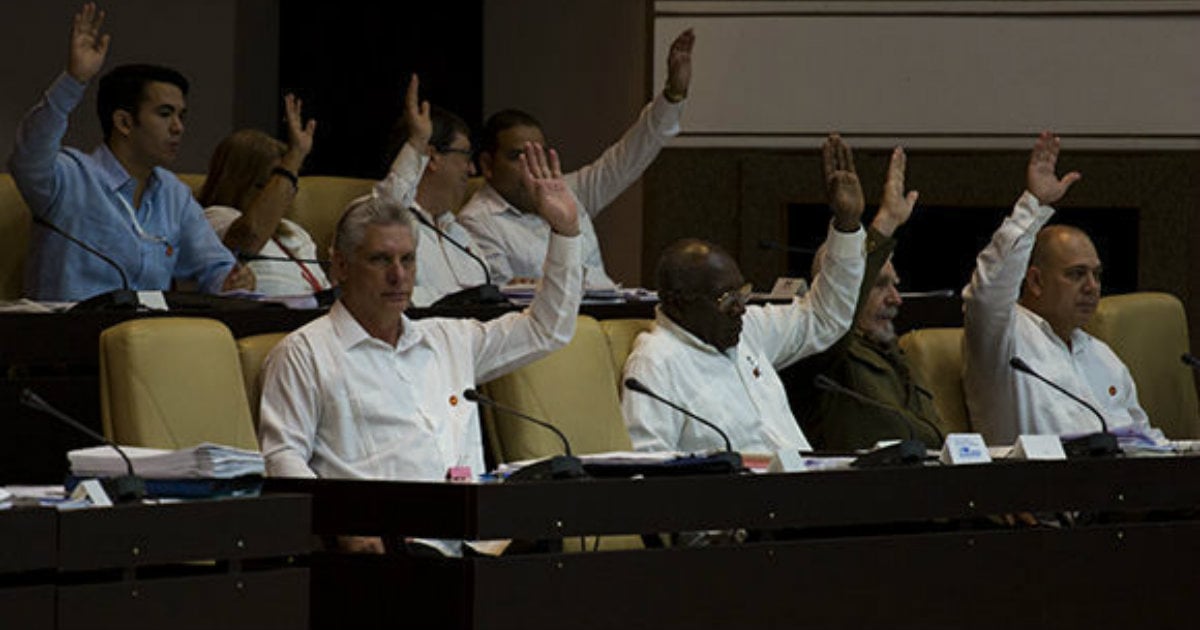The Cuban regime, always quick to strip citizens of their civil and political rights, can now also revoke their citizenship under a new draft law presented yesterday by the National Assembly. This legislation, consisting of 17 chapters and 114 articles, empowers the current dictator to issue Presidential Decrees that allow for the discretionary revocation of citizenship from Cubans based on legally vague terms.
Article 55.1 grants the President of the Republic the authority to strip any Cuban of their citizenship if they commit acts abroad deemed contrary to the high political, economic, and social interests of the Republic of Cuba. Such a clause would be insignificant if it weren't for the fact that in a totalitarian regime devoid of a rule of law like Cuba, the distinctions between the State, Government, and Communist Party often blur when issuing judicial decisions to criminalize political dissent.
Moreover, the law permits the revocation of Cuban citizenship from individuals who reside in the country or even from those who have no other citizenship to fall back on, effectively rendering them stateless by supreme mandate of a Presidential Decree. This provision can be enacted whenever the Ministry of the Interior deems that these Cubans pose a serious threat to national security, endanger the stability of the state, international relations, or the general health of the population—terms that are legally ambiguous in a country where walking with a protest sign can be seen as a threat to national security.
Alarms were raised on December 30, 2017, when the Council of State issued Decree Law No. 352, which prohibited granting citizenship to Cubans born abroad if their parents had committed acts or engaged in actions against the political, social, and economic foundations of the state.
Currently overwhelmed by economic crisis, mass exodus, and an obvious political crisis, the Cuban regime no longer hides its intentions, now formalizing on paper what it has been doing in practice for over six decades. The Communist Party itself coined terms like "anti-Cuban" or "mercenaries" to label all those who did not revere the Chief Dictator; stripping them of their political rights, properties, and exiling them while banning their return.
In practical terms, the communist totalitarianism that now seeks to revoke the citizenship status of all Cubans it deems inconvenient has, in fact, already done so to the entire nation. This is based on the understanding of "citizen" as an individual endowed with political and social rights grounded in the principles of equality and political participation.
The twilight of what was once the "Cuban Revolution," evident in a country steeped in despair and a Communist Party facing a widespread leadership crisis, is sufficient reason for the hurried approval of detrimental laws aimed solely at delaying an inevitable change that is visibly near. No bureaucratic dictator will have the moral ground to strip a compatriot of their Cuban identity. Those subjected to such legal atrocities should proudly display the greatest prize of Cuban identity: Not remaining indifferent to the barbarism in Cuba.
Understanding Cuba's New Citizenship Law
This section addresses common questions surrounding the newly proposed citizenship law in Cuba.
What powers does the new citizenship law grant to the President of Cuba?
The new law allows the President to revoke the citizenship of any Cuban who, from abroad, engages in actions deemed harmful to the political, economic, and social interests of the Republic of Cuba.
Who can be affected by this new law?
The law can affect Cubans living abroad, those residing in the country, and even those who have no other citizenship, potentially rendering them stateless.
Why is the law seen as a tool for political repression?
The law employs legally vague terms and the blurred distinctions between the State, Government, and Communist Party, making it a tool for criminalizing political dissent and repressing opposition.
